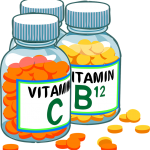Have you ever walked down the vitamin aisle in the store, become completely overwhelmed, then decided to go grab a broken cookie sample in the bakery section instead? Sometimes, having a lot of choices can become overwhelming! The realm of dietary supplements and dietary supplement safety can be daunting. The following information will help you to reduce your shopping time, become a savvy vitamin shopper, and buy safe, effective, vitamin, mineral and herbal supplements.
Buying Inexpensive Supplements
Please understand, although it is tempting to buy supplements from an inexpensive source, their motivation for the manufacturing of these supplements is profit. High quality raw materials from the USA (or other countries with high testing standards), studied substances and third-party testing are all costly, but very important in choosing a supplement that will help support your health versus one that will be ineffective, or worse, contain toxic, hazardous substances or incorrect and dangerous dosage suggestions on the label. In addition, some seemingly harmless ingredients such as corn or soybean oil in supplements can defeat the purpose of taking supplements as they can actually contribute to more inflammation in the body. (Look for our upcoming blog posts on OMEGA 3s and OMEGA 6s to better understand this)
A Word About the Word, “Natural”
Just because something says, “natural,” doesn’t mean it’s safe. It is important to keep in mind that every body is different, and that certain medications may not mix well with dietary supplements. It is also important to note that, because they’re concentrated, natural herbal supplements can be in much higher doses than what you find in nature. This concentration is what can make herbal supplements powerful in their ability improve health, but, in the wrong situation, can cause toxicity, discomfort, and even death. It is even quite possible for certain supplements to counteract or interact dangerously with other supplements.1 This is why it is imperative you discuss with your physician any vitamin, mineral or herbal supplement you currently take or wish to take.
Many patients are reluctant to talk to their physician about vitamin, mineral or herbal supplement use because they may feel their doctor either wouldn’t approve of dietary supplements, or doesn’t have much experience in the area of dietary supplements. If holistically-oriented health care is important to you, but your doctor is not open to discussing dietary supplementation with you, you may consider finding a doctor or licensed health care professional who is more open to holistic options.
The following example of vitamin toxicity underscores the importance of discussing with your doctor any supplement you are taking or are considering taking to see what is appropriate for you:
There was a young gymnast who went to see her doctor with four vertebrae that had fractured. After questioning, she mentioned she had been experiencing fatigue regularly and that her coach told her she should take a “lot” of vitamin B6 so she could get more energy from her food. This led to a career-ending vitamin B6 overdose for the young gymnast which made her unable to grip the uneven bars during a routine, causing her to fall and fracture her back.2 Had she discussed the possibility of taking vitamin B6 with her doctor, and what dosage would be best, this unfortunate accident may have been avoided.
Vitamin, Mineral and Herbal Supplements Must Be Certified for Current Good Manufacturing Practices
The Food and Drug Administration (FDA) requires certification for Current Good Manufacturing Practices (CGMP) for all manufacturers and packagers of products to, “ensure the identity, purity, quality, strength and composition of dietary supplements.”3 However, this is largely self-regulated by the manufacturers, and not actually enforced on a day-to-day basis, unless a third party is involved.
What is meant by GMP, CGMP, Certified GMP, and Certified CGMP?
- “GMP” means, quite simply, “Good Manufacturing Practices.”
- “CGMP” means Current Good Manufacturing Practices.
- “Certified GMP” or “Certified CGMP” means that the product has literally been tested by a third party or parties and is CERTIFIED as actually being a product of Current Good Manufacturing Practices. In other words: what you see on the label is what’s actually in the bottle, and nothing else.
Don’t Simply Trust, Research Is a Must!
Unfortunately, the distinction of whether or not a manufacturer has followed Good Manufacturing Practices is not easily made simply by looking at the bottle. Many companies that are not certified GMP manufacturers label the product as “manufactured using GMP guidelines” (which means nothing), whereas other truly certified GMP companies sometimes do not bother to note it on the label at all! Having knowledge of manufacturers and their quality control practices is important when selecting dietary supplements. Sometimes, this information is available on the company’s website, or copies of certificates can be obtained by calling the company. Further, even with certified GMP supplements (assuring what is on the label is what you’re getting), the product may not be formulated correctly, and can still contain ingredients that may not support your health. I have seen some certified GMP companies, for instance, that use formulations of minerals that are not well absorbed, or are chelated with amino acids that are not always good to take in large quantities, such as aspartate.4,5
Who Certifies Products for GMP?
Good Manufacturing Practices (GMP) / Current Good Manufacturing Practices (CGMP) can be certified by one or more of the following organizations:
- NSF International (National Sanitation Foundation)6 A non-profit, non-governmental organization which sets standards for product certification.
- USP The U.S. Pharmacopeial Convention (USP)7 is a non-profit organization which offers voluntary testing services for drugs, dietary supplements, and foods. When you see that something is USP verified, it means the manufacturer voluntarily submitted products for testing and that and their ingredients have met USP criteria.8
- TGA (Therapeutic Goods Administration)9 Located in Australia, the TGA works in concert with other international organizations and overseas agencies. It is a regulatory governmental agency of therapeutic goods.10
- NPA (Natural Products Association)11 The NPA is the oldest American non-profit organization that provides GMP certification.
Why You Should Care that a Dietary Supplement is Certified GMP
As upsetting as the thought may be, what the supplement label says may not be what you get. Some supplements may be inactive, toxic, tampered with, mislabeled, or contaminated.12
A troubling example of mislabeling is found in an article from The Journal of Clinical Endocrinology & Metabolism. In the article they discuss a case where a man developed complications while taking, among other supplements, a vitamin D supplement. According to the label, each capsule was supposed to contain 1,600 IU (99% as D3). Analysis showed that each capsule actually contained a much higher amount of the vitamin–a whopping 186,400 IU of vitamin D3. As if that wasn’t bad enough, there was also a labeling error recommending 10 capsules instead of just one per day. In all, the man consumed a total of 1,864,000 IU of vitamin D3 daily for 2 months. This is more than 1,000 times what the manufacturer stated on the label. Although there were no serious long-term effects, it did take several hospital visits and over a year of monitoring and adjusting his vitamin levels for the man to return to normal.13
What You Can Do
- Find out if your dietary supplements have been third-party tested, and that they are certified GMP/certified CGMP by one of the organizations listed above (the NSF, USP, TGA, or at least the NPA). Many times this information is not stated on the label and you must check the supplement company’s website, or contact the company directly and ask for a certificate.
- Even if they ARE third-party tested, look closely at the label to make sure it does not contain: corn oil, soybean oil, artificial colors or flavors, BHT, aspartate, tilapia, tin, talc, or hydrogenated oils of any kind.
- Make sure the dietary supplements are made or formulated in the USA.
Learn more about about ingredients that should not be in your vitamin supplements>>>
Please understand, it is extremely important you discuss with your physician or licensed health care professional any dietary supplements you take or wish to take. Dietary supplements can interact with prescription medications as well as with one another.


